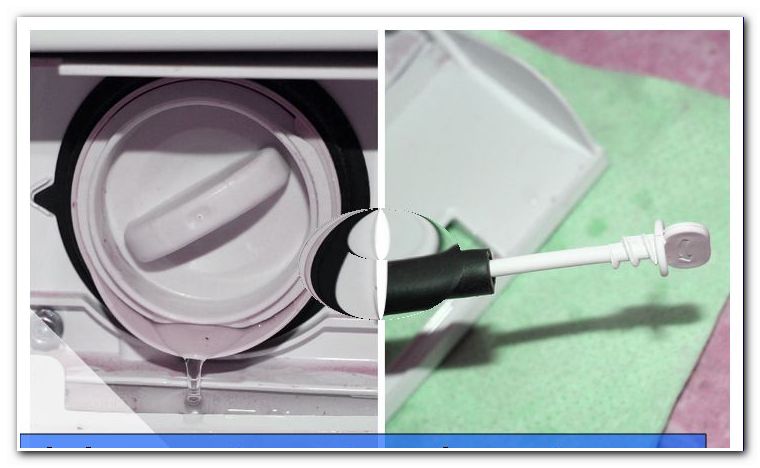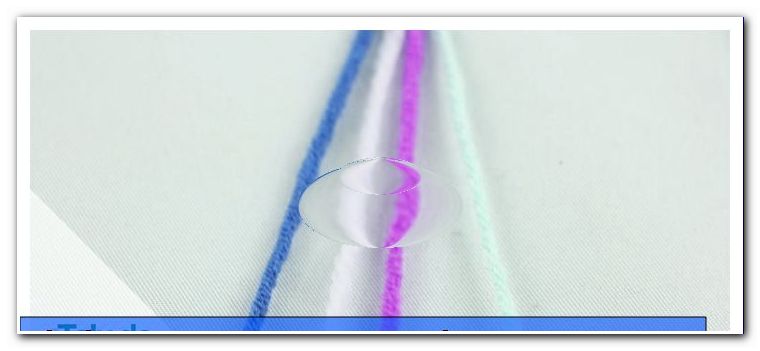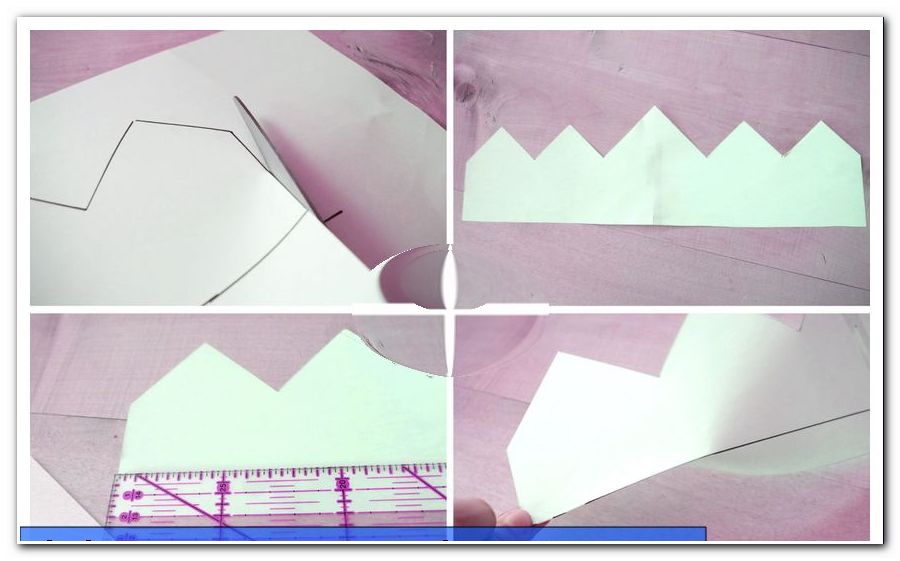The right size of dowel and screw - with table

- Operation of a dowel
- Dowel types at a glance
- Marking dowels
- Dimension table
- Masonry anchors
- Expansion dowel and all purpose dowels
- Aerated concrete anchor
- Hammerfix
- sanitary dowels
- Metal frame anchor
- insulation fixing
- hollow wall anchors
- Plasterboard plug
- Spring toggle bolts
- Metal hollow wall anchors
- All-purpose dowels
- Chemical dowels
The dowel is a small universal tool that is indispensable in the DIY and home improvement sector. With its help almost everything can be fixed to the wall or ceiling. It is important to always find the right dowel for material and load. This includes always using the right screw.
It is hard to believe that the practical dowel was invented until the late 1950s. The attachment of pictures, clothes hooks and lamps was a very time-consuming and destructive affair until it appeared: the craftsmen hammered a hole in the wall, put a piece of wood in it, cleaned it again and only then had a base into which one Wood screw could be screwed.
Operation of a dowel
The normal expansion dowel, the original form of the dowel, consists of a partially split hollow cylinder made of nylon. On the hollow cylinder plastic bottles or profiles are mounted for rotation protection. This small structural feature was causally responsible for the success of the anchor. It prevents the dowel from turning when screwing in the screw, which makes work unnecessarily difficult.
When screwing in the screw, the plug expands and is pressed firmly against the outer wall of the borehole. This creates a frictional connection between screw, dowel and wall. The strength of this connection depends mainly on the material of the wall. Loose clay walls keep much worse than high-strength concrete walls. That is why it is important to always choose the right dowel for the appropriate masonry. The industry now offers a large selection of dowels.
Dowel types at a glance
The choice of dowels is endless. We have put together only the most important types to give an overview of the possibilities. The universal expansion dowel is by no means the right choice for all applications.
The construction materials industry offers the following standard anchor types:
Masonry anchors:
- expansion anchor
- All-purpose dowels
- concrete plugs
- Hammerfix
- frame anchor
- Metal frame anchor
- sanitary dowels
- insulation fixing
Hollow wall anchors:
- Plasterboard plug
- Spring toggle bolts
- Metal hollow wall anchors
- All-purpose dowels
Chemical dowels:
- Two-component composite anchor
- composite mortar
Marking dowels
The type of dowel is always defined by a letter and a number. The letter indicates which dowel type it is. However, this information can be assigned differently depending on the manufacturer.

Fischer nylon expansion dowels have SX or C as letters, MEA dowels use F. The type designations are therefore not transferable. The number indicates the diameter of the bore. This is the same for all manufacturers.
Nylon expansion dowels and all purpose dowels are available in various sizes. The following overview shows diameter, length, screw diameter and length, recommended load capacity (depending on the building material of the wall) and unit price.
Dimension table
| dowel | screw | |||||
| O | length | O | length | load | Price / pc. | |
| SX 4 × 20 | 4 mm | 20 mm | 2-3 mm | 23 mm | 140 N | € 0.02 |
| SX 5 × 25 | 5 mm | 25 mm | 2, 5 - 4 mm | 29 mm | 330 N | € 0.023 |
| SX 6 × 30 | 6 mm | 30 mm | 3.5 - 5 mm | 35 mm | 370 N | 0, 029 € |
| SX 7 × 30 | 7 mm | 30 mm | 4 - 5.5 mm | 36 mm | 370 N | 0.058 € |
| SX 8 × 40 | 8 mm | 40 mm | 4.5 - 6 mm | 46 mm | 430 N | € 0.04 |
| SX 10 × 50 | 10 mm | 50 mm | 6 - 8 mm | 58 mm | 780 N | 0, 10 € |
| SX 12 × 60 | 12 mm | 60 mm | 8-10 mm | 70 mm | 1900 N | 0.15 € |
| SX 14 × 70 | 14 mm | 70 mm | 10 - 12 mm | 82 mm | 4150 N | 0, 27 € |
| SX 16 × 80 | 16 mm | 80 mm | 12 - 14 mm | 94 mm | 4150 N | € 0.33 |
| SX 20 × 90 | 20 mm | 90 mm | 16 mm | 106 mm | 5500 N | 0, 73 € |
It is always recommended to keep exactly to the specifications for bore diameter and drilling depth. These are always on the boxes or blisters, in which the dowels are packed. If you are not sure whether the necessary drill is also available, you should buy it right away. Otherwise, it is always very annoying when setting dowels is unnecessarily difficult on the construction site.
Masonry anchors
The masonry dowel is designed for fastening light to heavy loads in walls, ceilings and on floors. The most widely used are nylon expansion dowels and nylon all purpose dowels. However, it is recommended to always choose the right dowel for the application.
Expansion dowel and all purpose dowels
The expansion dowel is the standard dowel. It is particularly effective with solid masonry. Concrete walls, solid sand-lime bricks or solid brick walls can be worked well with the expansion dowel. For cavity walls, it is unsuitable.

The universal dowel or multi-zone expansion dowel or universal dowel can stretch not only like the expansion dowel in width. He can also pull himself together. As a result of the contraction, the expansion anchor forms a knot that can distribute occurring tensile forces very well over a large area. The all-purpose dowel is particularly suitable for perforated bricks and cavity plates. He acts positively. Another name for the all-purpose dowel is therefore also "knot dowel".
Aerated concrete anchor
The aerated concrete dowel is specially designed for the treatment of gas or aerated concrete. This building material is only very limited to train load, which is why special dowels must be used for this purpose. Aerated concrete dowels are always sold in a set and applied accordingly. The universal dowel is an adapted, normal nylon dowel for use on aerated concrete.

Gas concrete plug GB for loads up to 90kg - These plugs are recognizable by the extra large wings. They are hammered in after pre-drilling the hole with a hammer. The blades intersect with the aerated concrete and create a positive connection. After inserting a screw, an additional clamping force is added, so that sufficient tensile strength can be achieved for many applications. The prices range from 0.20 to 0.80 euros, depending on the diameter and quantity purchased.
Long shaft dowel SXRL for loads up to 105kg - The long-shaft dowel acts like a normal expansion dowel. He is plugged into the pre-drilled hole. The high clamping force is achieved by the length of the shaft. Long-shaft dowels are also suitable as frame dowels. In the set they cost about 1 Euro per piece including screw.
Hammerfix
Nail anchors are not provided with a screw. The object to be fastened is hammered in with a screw-like special nail. The nail plug is particularly suitable for quick installation of permanent connections. He is fast mounted. In terms of price, the nail dowel is based on the universal dowels.
sanitary dowels
Plumbing dowels are sets of extra long dowels with matching screw and accessories. They are particularly tensile and also shear resistant, since they are heavily loaded and must be very reliable. For example, suspended toilets and sinks must always be secured with plumbing dowels. The set consists of a galvanized or chrome-plated screw, washer, dowel and protective cap. A set from the brand manufacturer can cost up to 5-10 euros. In view of the sensitive task of plumbing plugs, the use of a branded product is recommended here.

Metal frame anchor
Metal frame dowels have a metal sleeve instead of a plastic dowel. They are usually sold in a set including a matching metric screw. They are especially popular in window construction because they offer high tensile strength. The prices range from € 0.45 to € 1.50, depending on the brand, size and purchase quantity.
insulation fixing
The insulation dowel serves exclusively to fasten light materials such as foils or blocking plates. Also for fixing an insulation board itself, it can be used. The industry offers many different formats and types, but all are made of plastic. This prevents a thermal bridge from forming on the dowel. The prices range depending on the brand, type and purchase amount of 0.02 - 1.00 Euro per piece.

hollow wall anchors
Attaching loads to a drywall is a particular challenge. The gypsum plasterboard walls are anything but resistant to tension and therefore have to be treated extremely carefully when loading. A range of dowels are available for securing light and medium loads.
Plasterboard plug
The plasterboard plug consists of a metal or plastic spiral, which is carefully screwed into the plasterboard by hand. With the help of a setting tool, this can also be done with a cordless screwdriver. Then the device is set to the lowest torque level. Inside, this spiral has a metric thread. For plasterboard dowels made of metal, only a suitable screw can be screwed. The plastic variants also tolerate suitable wood screws, but do not provide the tensile strength as metal plasterboard dowels. The screw has no additional mechanical effect on the connection between dowels and gypsum board. This method is only suitable for vertical and very light loads, such as cable guides, small pictures or wall decorations. Prices for plasterboard dowels range from 0.20 - 1.00 Euro, depending on the material and the size of the container.

Spring toggle bolts
The spring-loaded dowel is used exclusively for hanging loads on ceilings, which are covered with plasterboard. He needs a large hole and can not be removed. The folding mechanism creates a large contact surface, so that even medium heavy loads can be hung. Usual applications for spring clips are ceiling lamps. A spring-loaded dowel costs about 0.40 - 1.00 euros including matching metric screw, depending on the purchase quantity and brand. The screw is usually already executed as a hook, which greatly simplifies the hanging of the loads.
Metal hollow wall anchors
Metal dowels are sets that consist of a metal expansion dowel and a matching metric screw. They make a very stable connection, but it depends on the ground. Metal cavity dowels act positively and distribute the applied tensile force over a large area. They can be used for vertical and horizontal loads. For vertical loads, they are preferable to plasterboard dowels. Metal cavity dowels cost 0.70 - 1 Euro per piece, depending on the container size.

All-purpose dowels
Due to the form-fitting knot formation and the general purpose dowel for plasterboard can be used. They are sufficient for light assembly work.
Tip for kitchen spaces made of plasterboard:
A special challenge is to hang kitchen cabinets on plasterboard. This can only be done safely with special measures. One solution could be to use metal cavity dowels to screw a thick fiberboard panel to the wall. It should stand on the floor, so that the cavity dowels are not loaded by shear forces. With a ceiling slat, which can be covered, for example, under a wooden ceiling, the chipboard is additionally secured against tipping over. Then the wall cabinets can be mounted safely.
Chemical dowels
Chemical dowels are rarely used in DIY. Professional construction companies or installers of stationary machines often use these high-strength solutions. In special cases, the two-component composite mortar anchors may be necessary, for example in gas concrete walls. An anchor costs about 2- 4 euros plus two-component adhesive for about 6 euros per container and 5 euros for the caulking gun. However, composite mortar anchors only last as well as they are installed. An exact adherence to the processing instructions is absolutely necessary.




